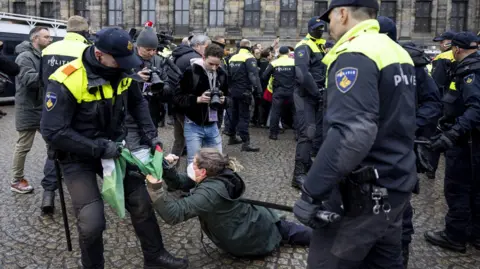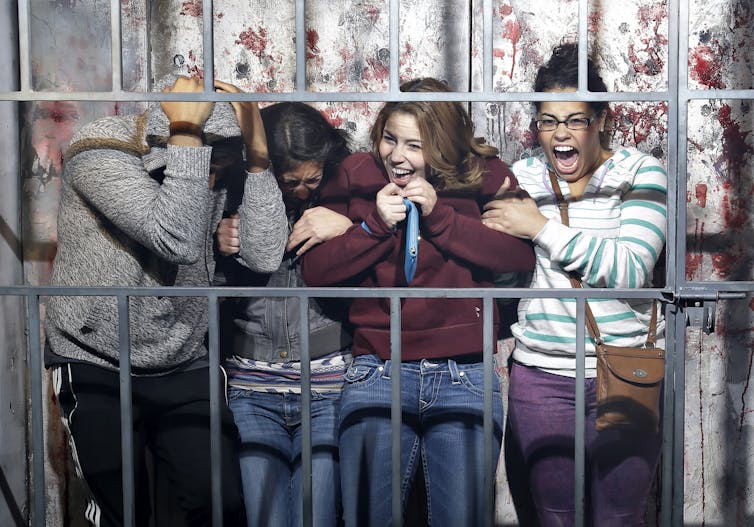4 hours ago
Aleks Phillips
BBC News

Dozens of pro-Palestinian demonstrators have been detained by police in Amsterdam after defying a ban on public protests in the Dutch capital.
Hundreds gathered in Dam Square on Sunday, calling for an end to the conflict in Gaza and expressing dissent towards the ban.
Demonstrations were temporarily banned by the mayor after Israeli football fans were targeted in what she called "hit-and-run" attacks on Thursday night after a match between Maccabi Tel Aviv and Ajax Amsterdam.
The Israeli government has advised its citizens to "categorically avoid" Israeli sports and cultural events while abroad - specifically the football match between France and Israel in Paris on Thursday.
Authorities say Thursday's attacks - which caused five people to be hospitalised - were motivated by antisemitism as the fans were sought out across the city.
The violence - which led to at least 62 arrests - was condemned by leaders in Europe, the US and in Israel.
The outcry was exacerbated by the attacks occurring on the eve of commemorations of Kristallnacht - Nazi pogroms against German Jews that took place in 1938.
Three-quarters of Jewish people in the Netherlands were murdered during the Holocaust in World War Two.
Amsterdam police said there had also been trouble the night before the match. Police chief Peter Holla said there had been incidents "on both sides", including Israeli supporters removing a Palestinian flag from a wall and setting it alight, and attacking a taxi.
The city's Mayor Femke Halsema announced a ban on public assembly on Friday lasting at least until the end of the weekend, deeming the city a "high-risk security area".
But protesters on Sunday argued they should be free to voice their disapproval of Israel's actions in Gaza and the actions of the Maccabi supporters.

"This protest has nothing to do with antisemitism," Alexander van Stokkum, one of the demonstrators, told the AFP news agency on Sunday. "It is against Israeli hooligans who were destroying our city."
Others told a Reuters journalist: "We refuse to let the charge of antisemitism be weaponised to suppress Palestinian resistance."
The news agency reported that more than 100 people were detained for attending the protest. Police in Amsterdam confirmed there had been arrests, but have yet to say how many.
Following the protest ban, Dutch activist Frank van der Linde applied for an urgent permit so Sunday's demonstration could go ahead.
On X, he said that he wanted to protest what he described as "the genocide in Gaza", adding: "We will not let our right to demonstrate be taken away."
Mr Van der Linde was overruled by Amsterdam's district court, which wrote on Sunday that "the mayor has rightly determined that there is a ban on demonstrating in the city this weekend".
Dutch national newspaper De Telegraaf reports Mr Van der Linde was among those arrested.
The Israeli embassy in the Netherlands earlier warned Israelis in Amsterdam to avoid Dam square, saying the event "may flare up into significant violent incidents".
Israel's National Security Council has told its citizens to avoid public demonstrations "of any kind" and conceal "anything that could identify you as Israeli/Jewish", citing Thursday's attacks.
"Preparations to harm Israelis have been identified in several European cities, including Brussels (Belgium), major cities in the UK, Amsterdam (Netherlands), and Paris," it claimed.
Paris's police chief has pledged that 4,000 officers would be deployed in the stadium and across the French capital for the Nations League match on 14 November.
Abbas Nasir

THE legacy media seems to have learnt no lesson from its debacle in the US presidential election, as its coverage based on its preconceived notions about the events in Amsterdam during a UEFA football fixture this week demonstrated.
The bulk of it continued to suggest that the presidential fight was neck and neck with a slight edge for Vice President Kamala Harris when the ground reality must have been very different, given the election result.
When street fighting broke out between Maccabi Tel Aviv-supporting football hooligans in the Netherlands capital for their team’s UEFA fixture against Ajax and those they attacked while there, from New York Times to the Guardian to the BBC many media outlets fell for the victimhood narrative Israel has successfully sold for decades.
Adolf Hitler and Nazi Germany perpetrated the Holocaust, in which some five to six million Jews perished in the last century. It was undeniably a grave, unforgiveable crime against humanity. The Jewish people and many around the world vowed ‘Never again’. This was a just resolve
The Amsterdam incident showed how many media outlets fell for the victimhood narrative Israel has successfully sold for decades.
But for the past 75 years, it has also been used to justify the occupation of Palestine, expulsion, murder and imprisonment of Palestinians; anyone with a conscience who objects or protests against this is labelled ‘antisemitic’ and demonised and castigated as being a ‘Jew hater’. Any specific criticism provokes outrage and is dubbed ‘an antisemitic trope’.
This narrative has been built by the subtle and often not-so-subtle control of and manipulation by the Western media and powerful Western governments whose politicians are compromised by receiving generous campaign contributions in exchange for toeing a pro-Israel line. I promise you, this sentence will also be labelled a ‘trope’.
It is important to make a distinction between Jews, of whom so many around the world and in Israel too, have expressed disdain at the apartheid state’s policies towards the Palestinians and Arab Israelis, and genocidal Zionists such as the one in control of Israel as we speak. The latter’s settler colonialism has very little to do with Jewish values.
But the genocidal Zionists’ excesses are often brushed under the carpet or even justified because they enjoy immense financial and political power in the West. Just google to see how they fund mainstream political parties in Western democracies to understand why they get a free pass to brazenly violate international law and norms. Anyone daring to call them out is vilified as antisemitic.
When the Amsterdam violence news started to break, most leading lights of the legacy media and Western leaders from the Dutch king to the prime minister to the EU president to the British foreign secretary started using terms like ‘antisemitic’ attacks and ‘pogrom’ in Amsterdam.
Surprisingly, UK’s Daily Mail was the first to report the violence in its correct context and then slowly but surely a trickle started to appear in the media. First in SkyNews, then a small piece buried in the labyrinth of BBC News. Then the US network NBC aired a video which was geo-verified as being from the site of the clashes showing acts of provocation.
But what the glorious British newspaper Guardian I have read for some 30 years, and that I now find so one-sided, has come to was underlined by its story and headline. Its initial headlines were outrageously pro-Israeli ‘fans’.
Even when the Amsterdam police chief detailed the provocative slogans and actions of the Israeli football hooligans including their tearing down the Palestinian flag from two homes, burning one of them and ‘destroying a taxi’, the statement was buried in the seventh paragraph of the Guardian story!
The slogans included “IDF will f…. Arabs” and “there are no schools in Gaza because all the children are dead”.
The counter-violence started when a crowd alerted by the taxi drivers’ WhatsApp group gathered to challenge the Maccabi ‘fans’. The police chief also told the media that Israelis who’d come to Amsterdam and whose team lost by a near-tennis score to Ajax went round the city the night before the match too raising inflammatory slogans.
I’ll leave it to your judgment if this was antisemitic violence targeting peaceful Israeli, read: Jewish, football fans or trouble provoked by genocidal hooligans. What the violence did achieve was again the overshadowing of the UN statement that 70 per cent of those killed in Gaza were women and children.
Enough of the horrible, brutal and ugly things that seem to dominate our lives these days. Now a few lines my wife Carmen Gonzalez, herself a journalist, wrote two days ago about the loss of someone very dear to us who was like an unshakeable pillar of support during our years in Karachi when we moved to Pakistan in 2006 from London.
RIP Arbab: “Today, our family had to say a sadly premature goodbye to someone very dear, very special, and who made our days in Pakistan so much better and so much easier. His name was Arbab, he drove us around, watched over us like a hawk, taught us the value of loyalty and always, always kept his endearing cute grin, his naughty half smile, and his good spirits. Arbab, the protector, could happily watch Dora the Explorer with Elena, take Alia to school through flooded streets and suffering from high fever (he would never admit to being ill), make sure he got the best parking spot ever, and wash the car (in his shalwar and vest with his starched shirt draped over a chair) while listening to the Three Tenors, his favourite CD, that he requested from me one sunny Monday morning. With his charming cheeky demeanour, Arbab could disarm the toughest of Bajis and get special treatment from the most unbreakable guard. He was a gem; he was part of our Pakistan family and we will never forget him. Rest in peace my friend. Thank you for so much! We will miss you, dearest Arbab.”
The writer is a former editor of Dawn.
abbas.nasir@hotmail.com
Published in Dawn, November 10th, 2024
'The Israeli fans instigated the violence after arriving in the city and attacking Palestinian supporters before the match'

Fans of Maccabi Tel Aviv stage a pro-Israel demonstration at the Dam Square, lighting up flares and chanting “Let the IDF win" and "F*** the Arabs!" ahead of the UEFA Europa League match between Maccabi Tel Aviv and Ajax in Amsterdam, Netherlands on November 07, 2024. Maccabi fans clashed with Amsterdam citizens and ripped off Palestinian flags hung on the streets.
Common Dreams Staff
Nov 09, 2024
Thursday night, Israeli soccer fans clashed with Amsterdam residents before and after a Europa League soccer match between their team Maccabi Tel Aviv and Ajax in Amsterdam.
Clashes occurred outside the Johan Cruyff Arena and across the city on Thursday night. Police on Friday said five people had been taken to hospital, and 62 arrests had been made.
The violence reportedly started when the far-right Israeli soccer hooligans began chanting racist and violent anti-Arab slogans, attacked Arab and Muslim residents, and vandalized houses and businesses with Palestinian flags.
Al Jazeera reported:
In one video, Israeli supporters were heard singing: “Let the IDF win, and f*** the Arabs!” referring to the Israeli army’s offensive on Gaza. Another video captured a fan screaming: “F*** you terrorists, Sinwar die, everybody die,” in reference to the Hamas leader who was killed last month.
The Israeli fans instigated the violence after arriving in the city and attacking Palestinian supporters before the match, an Amsterdam city council member said.
“They began attacking houses of people in Amsterdam with Palestinian flags, so that’s actually where the violence started,” Councilman Jazie Veldhuyzen told Al Jazeera on Friday.
“As a reaction, Amsterdammers mobilised themselves and countered the attacks that started on Wednesday by the Maccabi hooligans.”
Yet the corporate media - both in the US and abroad - portrayed the events as one-sided "anti-semitic" attacks on helpless soccer fans:
SEE
Israeli fans attack pro-Palestine supporters in Amsterdam
US President Joe Biden, his Secretary of State Tony Blinken, and Senate Majority Leader Chuck Schumer were quick to echo Israeli Prime Minister Benjamin Netanyahu's claim that the events in Amsterdam were unprovoked anti-semitic attacks reminiscent of pogroms or the Kristallnacht.
However many social media posts reported the context of the violence that was missing from corporate media reporting:









